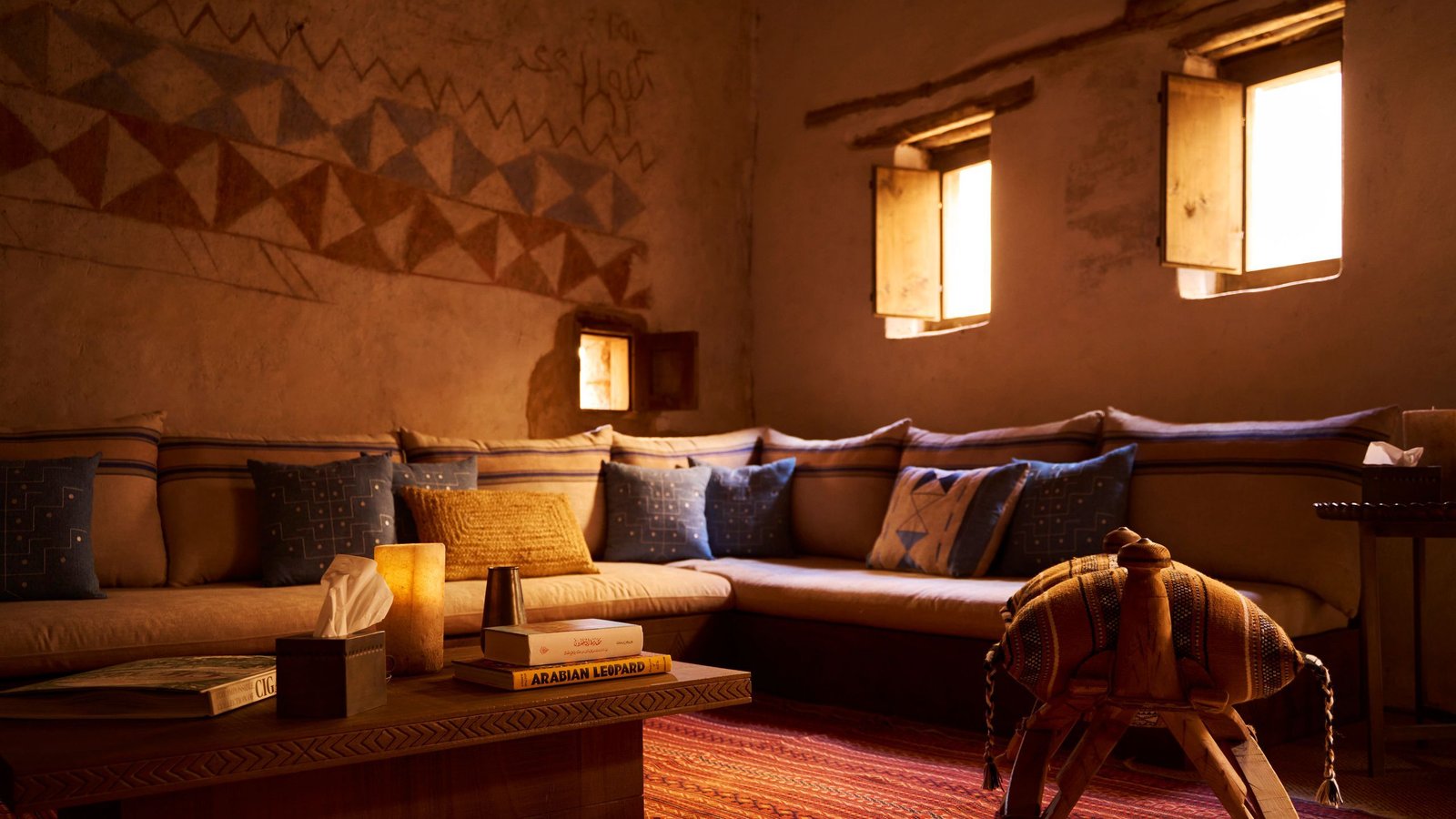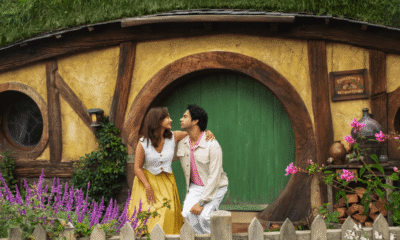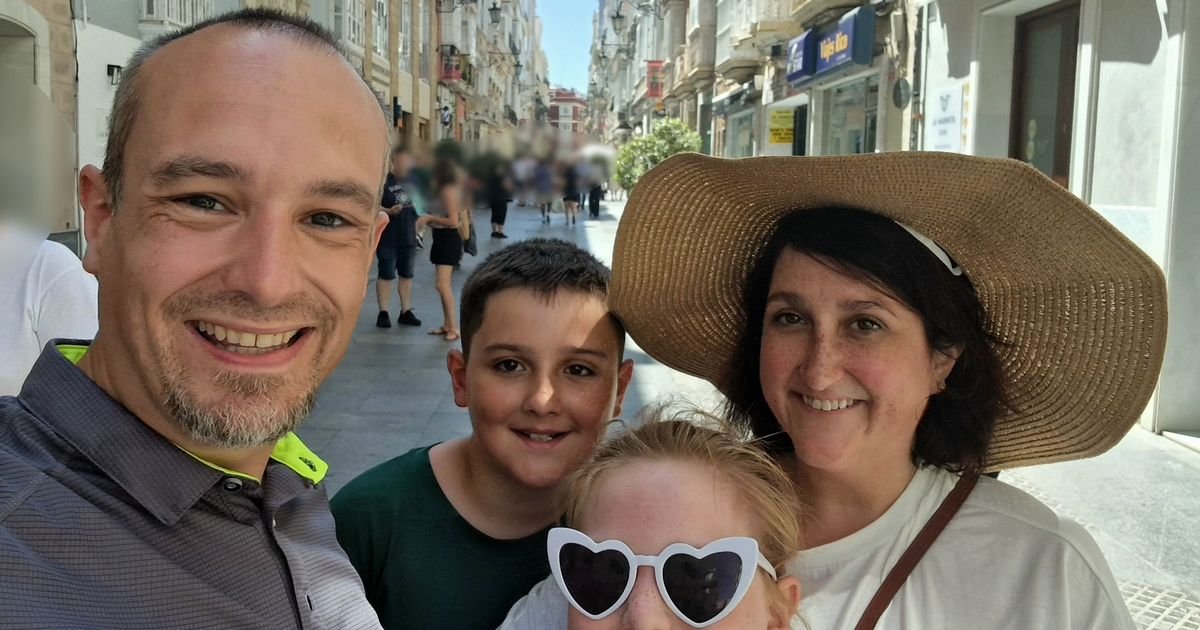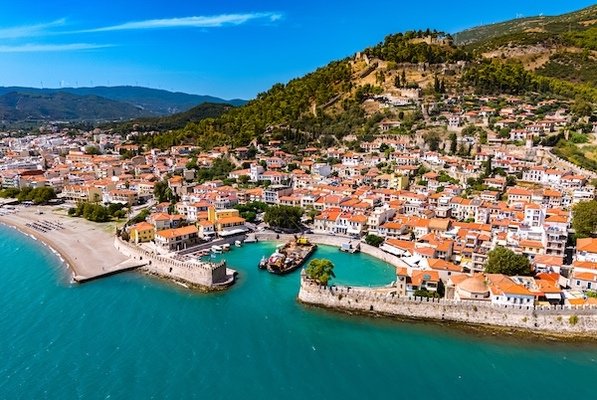Why book?
More than a hotel, this pocket universe in a rapidly developing part of northwest Saudi Arabia is a hospitality experience that takes guests back in time with cultural heritage activities and immersive architectural and interior design—without sacrificing modern amenities like a superb rooftop pool.
Set the scene
Across the road from a thriving oasis, Dar Tantora The House Hotel claims a cluster of buildings in a labyrinthine complex of mud-brick and stone houses abandoned in the 20th century. The restoration project was helmed by the Egyptian architect Shahira Fahmy, whom Phaidon described as one of the premier “architects building the Arab future,” and the scrupulous attention to detail succeeds in giving the impression that guests are stepping into a life-sized recreation of a centuries-old town in Saudi Arabia. Except it’s not a recreation at all. It’s the real thing.
The built space feels inextricably linked to the natural environment and the local community, past and present. Poufs and rugs were spun from natural fibers, while wooden doors were rough and hand-painted. Objects artfully strewn about like metal teapots and ceramic vases would tell a thousand and one tales if they could talk. In the sun, everything was some shade of sun-baked clay—ochre, sienna, umber. But at night, when over 1,800 candles and lanterns on property are lit by the diligent staff, all turned rich and golden as shadows danced across walls and murals. To say it’s simply atmospheric is not enough. It’s rather like entering a museum, one that you can live and sleep in.
Upon arrival, instead of the usual check-in experience—grab the room key and go—I was treated to a welcome ceremony that engaged all five senses: I was given a cool towel, offered a plate of dates, given a cup of freshly prepared Arabic coffee, and even presented an array of fragrant incense; I picked one to be burned in my guest room at turndown for the night. (I was told that normally music is involved too, but given that it was Ramadan, noise was kept to a minimum out of respect to those in observance.) As a series of touch points that set the tone for the stay, the ceremony felt genuine and immersive without being put-on or costume-y. It made the historic atmosphere seem that much more tangible.
I checked in before its official opening, but once Dar Tantora is in full-swing, I expect the clientele to be a mix of travel-loving retirees who have nearly seen it all, honeymooners keen to avoid the cliché fly-and-flop, and archaeology buffs who like their basecamps with a side of butler service (yours truly).
Take a look around
Firework content
This content can also be viewed on the site it originates from.
The backstory
A short history lesson: AlUla is an ancient market city in the present-day kingdom of Saudi Arabia, part of the historic incense trade route, with successive civilizations going back 7,000 years (evidence of the earliest human activity dates to 200,000 years ago). Despite the arid desert landscape, settlement in AlUla’s old town was made possible by the nearby oasis and unique geology that allows for the accumulation of rainwater in an underground aquifer, which early societies used to create innovative agricultural systems. Various peoples have claimed AlUla throughout the millennia, including the Nabateans, who created the famous rock-cut city of Petra in Jordan, as well as the similarly designed tombs at Hegra, which is now a UNESCO World Heritage Site just thirty minutes north of Dar Tantora.
Al-Ula’s cultural, historic, and archaeological significance spurred the kingdom to establish the Royal Commission for AlUla, which aims to preserve the area and develop it into a global luxury tourism destination—and it’s all shaping up nicely. Posh hospitality names like Our Habitas and Banyan Tree opened their AlUla outposts in 2021 and 2022, respectively; the tiny international airport nearby announced expansion plans in 2023. That said, the whole enterprise still feels nascent. Saudi Arabia opened to leisure tourists in late 2019; traffic picked up only recently post-pandemic. Expect more travel buzz to emerge from this corner of the country soon.
Which means Dar Tantora comes onto the scene at an exciting moment. It’s debuting at the ground floor, so to speak, and offers a guest experience unique among the current lodging options in AlUla. Dublin-based Kerten Hospitality, as part of its The House Hotel brand, is positioning Dar Tantora as a stay where travelers can feel not only part of the neighborhood, but of history too. All the details, from the design to the food to the cultural experiences, allow you to, in some small way, live like a local, or even briefly live in the past. On top of that, the hotel’s location—next to the AlJadidah arts and shopping district, and near cultural sites like Hegra and Elephant Rock (a colossal rock shaped like, yes, an elephant)—make it a perfect home base for a big-picture tour of AlUla.
The rooms
The overplayed hallmarks of contemporary luxury design are noticeably absent at Dar Tantora: no glass doors, no hyper-polished woods, no perfect 90-degree angles. Instead, doors to guest rooms are immense pieces of lumber, carved with intricate patterns. The floors are covered with ropey jute, layered with vivid red and oxblood rugs. Organic shapes and textures abound, from the grit of the mud-brick walls to the timber beams on the reed-covered ceilings. The resulting mood has a homeyness to it while bearing the weight of AlUla’s antiquity; whenever my feet touched the carpet or my hands grazed the bricks, I almost physically felt the past.
That’s not to say the rooms are without familiar five-star touches. In my room, there were phonographs and vinyl records at my disposal, beautifully woven lounge blankets to mitigate the evening desert chill, and gorgeous coffee table tomes about AlUla from the book publisher Assouline, perfect for learning more about the destination.
There will be 30 rooms ready upon Dar Tantora’s opening; there are 10 more in the pipeline. There are four categories: “Dar Al Luban” is the entry level; “Dar Al Bukhour” rooms have a lounge area; “Dar Al Hareer” rooms have both a lounge and a terrace with daybeds; and “Dar Al Oud” suites are set up with two bedrooms. Each accommodation’s layout is unique; no two are the same. A heads-up: There’s also no air conditioning—save for ceiling fans—but the age-old design trick of cross-ventilation ensures sufficient airflow; I bundled up with the crisp duvet every night during my March stay. Electrical outlets are limited; there’s just one in the bathroom and another in the bedroom, encouraging not only immersion into AlUla, but disconnection from everything else. But of course there’s reliable Wi-Fi in the rooms and throughout the property, a necessity to stay in touch with the butler service via WhatsApp.
Additionally, there are no electrical lights in guest rooms, save for sconces by the bathroom mirrors. In the evenings, candles and lanterns burn in every nook and cranny (lit at sundown by the fastidious staff), lending the rooms a glow of romance and adventure. The atmosphere whisked me away from the new millennium to some bygone era when Scheherazade herself might have appeared at the foot of my bed and told tales until the break of dawn.
Food and drink
Joontos is Dar Tantora’s all-day restaurant, a “food-sharing concept” endemic to all The House Hotel properties (the name comes from the Spanish juntos, meaning “together”), and set up in an open-air courtyard in the heart of the hotel. At night, the staff lights candles for illumination, as well as two fire pits, depending on the temperature. The kitchen serves Saudi and regional dishes with ingredients sourced locally from the nearby oasis. Highlights: the falafel, the muhammara (a Levantine dip made of walnuts, red bell peppers, and pomegranate molasses), and a condiment of minced fermented black olives that was so fragrant I nearly rubbed some on my wrists as perfume. At breakfast, more Western fare like buttery chocolate croissants and delicately poached eggs on a bed of avocado were my repeat orders and filling enough for a morning of excursions throughout AlUla.
There’s also a café concept, Maqha, that manifests as tables, couches, and gorgeous woven carpets scattered across Dar Tantora’s staggered roofs, where diners get 360-degree views of the landscape while sipping on coffee or tea. In-room dining is also available, and orders can be placed with the hotel’s butler service through WhatsApp.
Most exciting were the culinary experiences that offer a glimpse into life in AlUla. One morning, a woman joined us on property and made traditional bread on a hot plate, spreading dough across the scalding surface to create delicate and crisp sheets made for dipping into everything I could get my hands on. And during the welcome ritual at check-in, a mustachioed man prepared Arabic coffee with great flair; he was lovely company in between coffee services throughout the day. Even the ubiquitous plates of dates found in the lobby and guest rooms reminded me constantly of where I was. By sundown, I often had enough date pits in my pocket to plant my own orchard.
As a reminder, the sale and consumption of alcohol are strictly prohibited in Saudi Arabia, so manage expectations accordingly. However, I was offered a variety of mocktails during my stay, including a fabulous drink that resembled a whiskey sour.
The spa
Construction work on the spa is still in progress, but in the interim, Dar Tantora offers in-room treatments. As for the treatments themselves, the plan is for the menu to take inspiration from local wellness and healing modalities, and use products made in Saudi Arabia. Meanwhile, the lap pool on the hotel’s rooftop is already open. It’s classically stunning, a sublime reprieve from the desert heat. Face east and you’ll see the verdant canopy of the oasis across the road; look west and the mountains will impress even the most well-traveled of pool connoisseurs. Around the water’s perimeter are day beds and umbrellas for shade. In the evening, when the mercury drops, heat lamps ignite and—you guessed it—hundreds of candles illuminate the scene, all sure to inspire midnight dips.
The neighborhood/area
While the other big-name hotels in the area prize seclusion, Dar Tantora emphasizes its connection to AlUla. One of its draws is its next-door proximity to the AlJadidah Arts District, a long avenue dotted with sleek souvenir shops, boutiques featuring local brands, charming cafes, stylish galleries, a strikingly beautiful mosque, and a place selling bottled camel milk. (I would’ve loved to report back how it tasted but, alas, I am lactose intolerant.) For those of us who need oat milk, there’s even a Starbucks. As for restaurants, spots like Zalata and Somewhere sling oasis-to-table fare, attracting locals as well as tourists. Recently, AlJadidah hosted a dining pop-up by superstar chef Alain Ducasse, a sure harbinger of the culinary talent that will pass through AlUla in the years to come.
The art in AlJadidah deserves a special callout. Design Space AlUla spotlights AlUla’s core goals and aesthetic principles (in short: sustainable design as a foundation for high-quality tourism that supports the local community). Madrasat Addeera teaches tourists and local women traditional crafts like jewelry-making and palm-weaving; its ateliers support the neighborhood’s economy. And when I visited, a gallery space hosted a powerful sculpture and mixed-media exhibit by the Saudi Arabian artist Manal AlDowayan, “Their Love Is Like All Loves, Their Death Is Like All Deaths,” originally presented in Madrid’s Sabrina Amrani Gallery in 2023. All were impressive demonstrations of the Royal Commission for Al-Ula’s vision for the area, elevating the destination’s global profile through art, contemporary design, and sustainable development.
The service
After a multi-day journey that involved canceled flights and lost checked luggage, I was grateful to be welcomed to AlUla by the supremely warm and well-intentioned staff at Dar Tantora. They took every opportunity to make my stay more comfortable and managed the chaos of tracking down my suitcase. They even got in direct contact with Saudi Arabian Airlines to monitor the search. (I eventually recovered it four hours before my departure flight back to New York via Dubai. Sometimes, you just have to laugh.) Deprived of a change of clothes, one of the drivers took me to a place where locals shop and acted as my interpreter while haggling with shopkeepers. Also, housekeeping offered to launder the few clothes I did smartly cram into my carry-on. Even if your journey to AlUla goes smoothly and without incident, the staff and their competent but easy-going service style will surely delight, with round-the-clock butler service via WhatsApp for requests like room service and lighting your room’s candles at night.
For families
Nothing at Dar Tantora caters particularly to children—no kiddie pool, no arcade, no daycare center. There’s nothing stopping guests from bringing them along, though I imagine they’d get bored quite quickly. The open flames might pose a safety risk as well. If you’re traveling with a teenage archaeology nerd, however, then Dar Tantora’s mud-brick maze and the excursions into AlUla’s cultural sites would make for the best field trip ever.
Eco effort
This hotel’s sustainability principles are most evident in the design and utilization of the mud-brick structures Dar Tantora calls home. The architect Shahira Fahmy’s restoration program emphasizes local organic materials and heritage building techniques to remain in-step with the existing buildings’ essence. As Dar Tantora continues work on expanding its facilities, the hotel aims to make use of what’s already built into the environment, minimizing new builds, energy usage, and disruption of the landscape. The original ventilation and drainage systems are used to great effect, though I’m left wondering how sustainable it will be to light, burn, and replace over 1,800 candles at the hotel on a daily basis.
Accessibility
Given that the hotel’s layout has to work with existing ancient architecture, there are some areas that may be difficult for some to access. There are stairs everywhere—to the pool, the Maqha cafe, the spa—and no elevators on the property. Though there may be ways to get to those places via ramps and inclined paths, I didn’t see them during my stay. Furthermore, many of the guest rooms are duplexes, and the stairs can be variably tricky, as some inclines are steeper than others. I suggest calling ahead and working with the staff at Dar Tantora to arrange a stay that’s as accessible as possible.
Anything left to mention?
All in all, it’s almost a misnomer to call Dar Tantora simply a “hotel”—perhaps that’s why the marketing copy frames it as “an eco-community experience.” The phrase, prior to my visit, struck me as yet another bit of empty industry jargon. But after, well, experiencing this eco-community, I have to admit it’s an entirely accurate way to describe it. Far from gimmicky, the approach to the guest and on-property experience (can’t get away from that word!) put me that much closer to a history and culture I was already curious and eager to learn more about. If you need the usual trappings of global luxury at your fingertips while visiting AlUla, there are hotels in the area that have you covered. Choose Dar Tantora if you’re looking for an experience that’s out of the ordinary—as in, extraordinary.




































